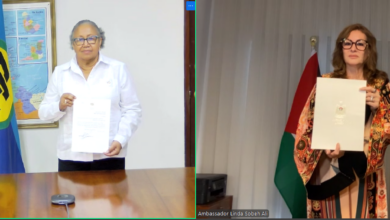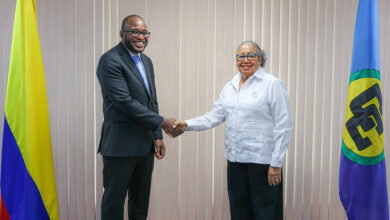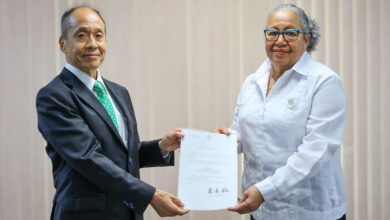Madam Chair (Dr Lucy Steward, Registrar CXC)
Professor Kenneth Hall, Chairman of CXC
Professor Compton Bourne, President of the CDB
Dr. Stafford Griffith, Pro-Registrar CXC
Other Distinguished Guests
Members of the Media
Ladies and Gentlemen
This evening we celebrate an event of signal importance in the development of our Caribbean Community – the 30th Anniversary of the establishment of the Caribbean Examinations Council (CXC). Testimony to the outstanding achievements of this body can be gleaned from the fact that here this evening to pay deserving tribute are representatives of some of the major Institutions and Associate Institutions of our Caribbean Community such as – the Caribbean Development Bank, the University of the West Indies and indeed the CARICOM Secretariat – all of which have benefited significantly from this important mechanism for regional human development.
For me, the Community and the Secretariat, it is with special pleasure and pride that we participate in celebrating this landmark with the CXC, at the same time as the 30th anniversary celebrations of the entire Caribbean Community, are in full swing. Indeed tonight in Suriname, the Hon. Maxine Henry-Wilson, the Minister of Education, Youth and Culture of Jamaica, is delivering the third in a series of distinguished lectures following that given by Dr. Gonsalves the Prime Minister of St. Vincent and the Grenadines in Port of Spain on 12th February and that by Professor Rex Nettleford in Guyana 21st March, in commemoration of the 30th Anniversary of the Community. But here, in Barbados, tonight belongs to the Caribbean Examinations Council, undoubtedly one of the success stories of our integration movement, indeed one of the brightest stars in the Caribbean’ institutional firmament.
The Caribbean Examinations Council (CXC) was established by Agreement among Governments for regional organization that will provide:
-syllabi of the highest quality, valid and reliable examinations and certificates of international repute for students of all ages, abilities and interests; and
-services to educational institutions in the development of syllabi, examinations and examinations’ administration in the most cost-effective way.
In other words, the mandate of the CXC was to fashion a response to the Human Resource Development needs of the Region.
Indeed the context in which this requirement became necessary was one where the regional leaders had recognized that the externally based examinations at the secondary level were becoming increasingly less relevant to our society. This was not only due to the obvious need for a learning environment with which the students were familiar, but critically in light of the necessity to create learning programmes that would cater to our peculiar development needs. Further the United Kingdom, from which the examinations came, was at the time, moving inexorably towards the European orbit, opening the real possibility of a widening of the relevance gap between the examination and the examined.
The examinations and curricula from the United Kingdom, did however serve the purpose of providing a standard of excellence. The CXC was therefore charged not only with enhancing the relevance but also with maintaining the excellence of our examinations, a task that it has undertaken with skill and devotion, and achieved with distinction. A measure of its success can be gleaned from the fact that, one of the CXC’s signature approaches to certification, the School Based Assessment, was adopted by the UK when it redesigned its examination programme for the General Certificate of Secondary Education (GCSE).
In devising its systems, Ladies and Gentlemen, the CXC and the Caribbean as a whole, have shown that we as a Region have accepted the responsibility for the development of our own human resources. Indeed, success in this regard has resulted in non-English speaking Caribbean countries as well taking part in various aspects of the CXC programmes. This welcome development is a sure sign that the programmes have been recognised as being responsive to the needs of the region as a whole.
That responsiveness is critical to the continuing success of the CXC. It may seem to be a heavy cost to bear, given the fact that there may not be unanimity among member countries with respect to their individual training needs. Also in addition, note must be taken of the fact that our policy planners are now looking at increasing CXC’s workload with the prospect of common certification, at the level of the third form of secondary school.
But as we are all aware, one of the problems with success is that it brings with it, greater challenges and demands. A brief look at CXC’ history fully confirms this. When CXC first administered examinations for the Caribbean Secondary Education Certificate (CSEC) in 1979, for example, only five subjects were examined, 30,194 candidates registered for the examinations and there were 58,708 subject entries. By 2002, CXC was administering 48 subjects for the CSEC examinations – (30 at General Proficiency, 14 at Basic Proficiency and four at Technical Proficiency), One hundred and twenty-two thousand, six hundred and twenty-one (122,621) candidates registered for the examinations and there were 464,486 – that is nearly half a million-subject entries.
Following the firm establishment of the CSEC examinations, CARICOM Ministers responsible for Education, in the early nineties mandated CXC to develop a regional examination that would be at least equivalent to the “A” Level, but differing in its philosophical assumptions and, consequently, in its structure. In response to this mandate, CXC developed the Caribbean Advanced Proficiency Examination (CAPE). It is argued that the structure of CAPE, with Units and Modules for the various subjects, gives greater flexibility in studies at this level. Candidates can opt for breadth or depth of study and can build on Units to acquire a desired grouping for further study or for the workplace. This, I understand, is another aspect of the CXC’s work that has been adopted in the UK.
CAPE was first administered in 1998 in seven Units and 797 candidates registered for the examinations. Four years later, the number of subject Units available grew to 40 and the number of candidates to 5,741. With two countries, St. Vincent and the Grenadines and Trinidad and Tobago entering candidates for CAPE for the first time in 2004, the number of candidates will increase significantly, in what will now be 12 participating countries. This growth will certainly contribute towards achieving the goal set by the 1997 mandate of Heads of Government, which called for a 15 percent enrollment of the post secondary age cohort in tertiary-level education programmes by 2005 – a key objective of the Caribbean Community.
This immense growth in CXC is testimony to the relevance of the subject offerings and the currency of CXC certification as a foundation for further education and training, as well as for the workplace. Preparation for the latter aspect, i.e. the workplace, must provide one of the key links to be forged, with industry, as the Community seeks to harness its resources in the drive to construct a viable and sustainable economy and a prosperous society. In fact, the continuing and deeper involvement of industry in the planning of the Organisation’s programmes is absolutely necessary, to ensure that there is a sufficient cadre of citizens, adequately trained, both to fulfill the requirement of employers and to be entrepreneurs in their own right.
These programmes would need to be tailored to suit specific goals on which there is agreement among all the stakeholders including government, business, labour and educators.The education system of which CXC is the critical motor, must be effectively linked to these agreed development goals so that the graduates would be able to fit efficiently into the work place, including being able to create their own employment. In seeking new opportunities to such education and training, the relationship between the CXC and industry must be a systematic and cohesive one. There is, I also venture to suggest, scope for the CXC to enter into partnerships to provide certification for programmes that are offered at the workplace and in other out-of-school situations.
Ladies and Gentlemen the region’s drive towards establishing the CARICOM Single Market and Economy literally throws down the gauntlet to the CXC. The key component of the CSME is the development of human resources to provide the regional economy with the skilled labour it needs, for this goal to be achieved.In this regard, your Council Mr. Chairman of CXC, would seem to need to play a more prominent role in the affairs of the Community. This is specifically with the Prime Ministerial Sub-Committee on the Single Market and Economy which, assisted by the Council for Trade and Economic Development, guides the process of development of the Single Market and Economy. In their deliberations, those two Community bodies point the way to the areas of economic growth, which are the Community’s priorities. Also, in this era when the regional economy is predominately services-oriented and tending to become even more so, the CXC’s capacity must be strengthened in this direction. For make no bones about it, the success of the CSME is as dependent on a highly skilled workforce as it is on investment.
Madame Chair, Ladies and Gentlemen, the development of the necessary skilled workforce brings with it the necessity to ensure adequate capacity and resources to deliver that product. On this I need say no more. Further, as we have seen starkly in recent times, even if we succeed in developing the product, there is no guarantee that we would have full use of it. The exodus of our trained personnel puts an added onus on institutions like the CXC, to increase not only its numbers and subject areas but also its cachment range.
The time may therefore have come for the Council to examine the possibility of providing its services outside of the traditional milieu. The provision of delivery services such as distance learning should not only be a mechanism to provide tertiary education, but should also be used to provide the scope to pursue such higher learning even after leaving the school building, as well as to create opportunities for life-long learning. This is certainly one way in which the region can increase its numbers of trained personnel to cushion the effects of the exodus.
No less important than the equipping of our youth for the world of work is the recognition of the need to educate our children for Life. This is vital in achieving many of our Community’s other objectives including attaining a healthy lifestyle and eradicating poverty. The Prime Minister of Belize the Hon. Said Musa at the recent opening of Parliament put it this way:
“Equally important is our obligation to preserve and promote healthy attitudes among out people, attitudes that encompass the spiritual, moral, intellectual, physical and aesthetic development of out youths. Our educational policies will not make the grade if the adults who emerge from the system fail in their responsibilities as citizens. It is therefore vital that from early childhood out children are imbued with a sense of social responsibility, self-esteem and self-confidence.”
Believe me I am tempted to add that it might even help our cricket!
Ladies and Gentlemen, Ministers of Education, at the Sixth Special Meeting of the Council for Human and Social Development held last month in Trinidad and Tobago, quite appropriately recorded appreciation for the work of CXC, and reaffirmed their commitment to support this valuable regional organisation. In this its 30th year, it is indeed fitting that all pay tribute to the CXC – the Chairman and Registrar, current and past, members of the board and staff of the Council, to the many teachers, examiners, panel members and other resource persons who have contributed to the successful operations of the Council – and continue to do so.
In closing I cannot help but feel that the well-known integrationist, the late William Demas would have been very happy to join in these celebrations tonight as he was particularly insistent that the education systems should subserve the integration movement, and the CXC is doing just that.
The vision of the policy makers to establish a regional body, that will indigenize curricula and provide certification, that has regional and international currency has been realised and has paid significant dividends.
Today CXC is a household name.Persons who have benefitted from CXC certification have excelled in further education. They now hold key positions at regional and international levels and have made significant contribution in various fields of research. We can therefore all be proud of yet another indigenous institution – the UWI not forgotten – that plays a leading role in the development of the region’s richest resource – its people, particularly its youth.
The CXC and CARICOM are celebrating their 30th anniversary this year. It is, therefore, a very special pleasure for me to congratulate CXC as one of CARICOM’s earliest institution, and to wish the CXC family continued success in their efforts to ensure relevance and excellence in the education of our society across the entire Region.
And as a symbol of the Community’s appreciation for the contribution of the Caribbean Examinations Council, Mr. Chairman and Mme Registrar, it is my pleasure to present you both with these tokens of our appreciation.





